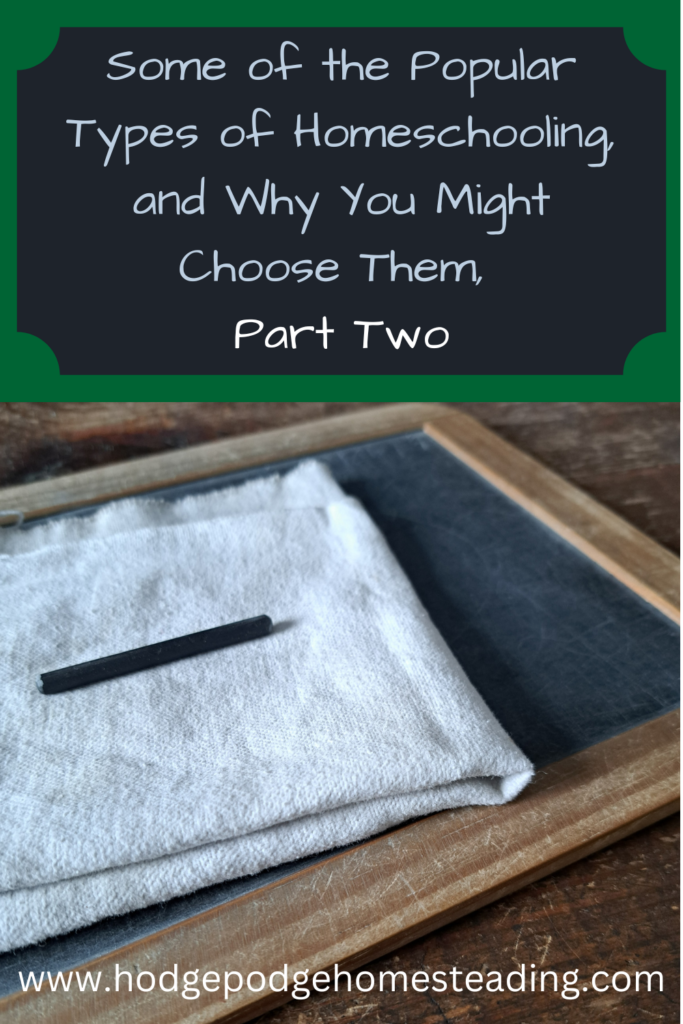Onto the second part of our series! This time we are talking about some popular types of homeschooling that focus on learning a different way. Most of them would still have a lot you will recognize, to the point that most of them have brick and mortar options in some places. Don’t be scared, we aren’t venturing that far off of the beaten path quite yet…

Some New Educational Philosophies
Charlotte Mason Education
This is where the ideas of classical education we explored previously blend with the more child centric ideas that are about to follow. It is based on the writings of Charlotte Mason, an educator who published books and lectures between the late 1800’s and early 1900’s. She advocated strongly for quality education at home, during a time period where home education was still a common option.
Charlotte Mason education is sometimes included as a sub-type of classical education because it focuses on many of the same subjects (Literature, languages, history, the arts, natural sciences). I have included it with the different philosophies because Ms. Mason had remarkably modern ideas about how to teach and about children. One of her most quoted phrases is that “Children are born persons”. Her methods treat children with a respect that is unusual even sometimes in modern times. She believed that they have a natural love of learning that it is our duty to cultivate, by exposing them to the best ideas in ways that preserve that interest and wonder. She is famous for the phrase “living books” which describes the sort of engaging literature she used instead of textbooks. She advocated for the teaching of good habits, leisure time to pursue interests and handicrafts, and plenty of outdoor time in nature.
Pro’s and con’s: You may have already guessed that I am a fan of this one. While we are technically eclectic homeschoolers (meaning simply that we take what we like from any of the other types), we use a Charlotte Mason philosophy as a base. For me the pro’s are that it includes a lot of the things that I think are important, like good books, the arts, history, and natural sciences. Especially living books. It was the discovery of books written by people passionate about a topic that re-kindled my love of learning and lead me to want to homeschool, long before I had a name for them. It also emphasizes lots of time outside in nature, time to follow their own interests, teaching them crafts and life skills, and helping them to develop good habits.
The cons are similar to classical education in some cases. It is a very literary way of learning that may not work as well for some children. Some versions are very West-centered, though there are resources to remedy that these days. It can lean more towards the natural sciences and less technology. It can be a bit more academically challenging, but is easily modified to your student’s level. Many of the sources are religious based, which may be a pro or a con for you, but it is easier to make secular than many curriculums because you can swap individual books. Finally, you are going to end up with a lot of books. So many books.
Waldorf Education
You are more likely to have heard of this one. You may have seen brick and mortar Waldorf schools depending on where you live (we have one nearby with a lovely, nature based playground out back). It is also popular to style daycares or preschool home education after Waldorf ideas. You will see an emphasis on time in nature, gentle rhythms, natural materials and stories.
Waldorf is seen most often in the younger years, but the whole philosophy extends straight through to high school education. They believe that there are specific stages of development in childhood and gear how and what they teach to that. They believe that teaching a child to read is not developmentally appropriate until age 7, which can be a shock to North American parents. (There is good evidence for this from both other countries with exceptional education systems such as Finland, and child development research. I don’t mention this as a criticism, just as a warning that it might seem very strange if you have never come across the idea before.) There is a strong focus on artistic and practical skills, as well as intellectual ones.
One of the larger criticisms of the movement are some of the strange and racist ideas of the founder. It was begun in Germany in the early 1900’s by Rudolf Steiner. If choosing to follow this style of education you will want to research his principles further. Obviously if you are homeschooling based off of this philosophy you have complete control over which ideas are included in your home, so this may not be a problem for you. There can be a bit of pressure from others who believe strongly in the method to not deviate. This can be a problem if you have a child who is at a different developmental stage than their peers, such as one who is eager to read earlier and frustrated at the delay, or families that follow a different lifestyle.
I don’t want this to discourage you from looking farther into this type of homeschooling though. It has many valuable ideas that are excellent for children, especially in the younger years. A peaceful rhythm to your days is a wonderful “pro” to recommend it to your list.
(Don’t panic, you’ll be spared novels on the last two!)
Montessori
Montessori is probably the name most familiar to you in today’s post. It is used almost exclusively in the younger years, though I believe the philosophies translate to older students as well. It was founded by Maria Montessori, an Italian Dr, and focuses on teaching children to master skills themselves. It is a popular approach for brick and mortar preschools as well as at home. Tactile skills, tools the right size for their hands, and real tasks to accomplish are strong focuses. Respect for children is at the root of helping them master tasks and be included as valuable members of family life.
Some downsides would be that you might feel pressured to follow the methods closely, when some may feel a bit extreme (mattress on the floor instead of a crib, only a very few toys or books etc). Some benefits are a very child friendly environment with learning geared towards their developmental stages. Definitely another that is well worth at least reading about to see what a different type of education might look like.
Unit Studies
Lastly, and very briefly, some people choose to structure their children’s learning into the form of unit studies. Unit studies are something we are all familiar with, and have probably enjoyed, but I have included it in with the different philosophies because some believe that subjects should not be divided up artificially like in a traditional classroom.
Phew! You made it! Only one more left in the series. Next time we are really going to challenge what you might think school should look like.
I will post links to the next two posts in the series as I write them.
Part One: Familiar Faces of School
https://www.hodgepodgehomesteading.com/2023/05/05/some-of-the-popular-types-of-homeschooling-and-why-you-might-choose-them-part-one/Part Two: Some New Educational Philosophies
(You are here.)Part Three: Questioning What School Can Look Like
Some of the Popular Types of Homeschooling, and Why You Might Choose Them, Part Three.

